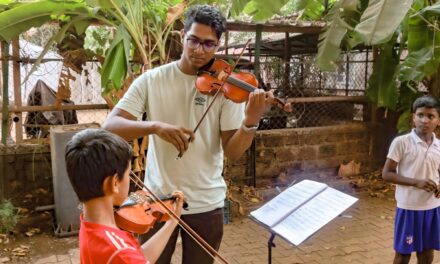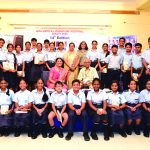The University Grants Commission (UGC) has taken various initiatives to bring in academic reforms in the higher education institutions in India. And while institutions begin adopting them there’s a lot that still needs to be understood
Sridhar D. Iyer
For a year or so, the University Grants Commission (UGC) is in a change-spree mood and has already implemented certain reforms in the higher education system, while more changes are on the anvil.
National Education Policy: This pertains to radical changes in the way students will be able to choose their subjects, wherein the offerings will be of an inter-disciplinary nature. Students can exit or enter courses anytime and accordingly be awarded their respective degrees by their university. For example, in an undergraduate (UG) course with a four-year duration if students complete their first year then they will be given a certificate of completion, a diploma on the completion of their second year, a degree on finishing the third year, and a BA (Honours) degree on completion of the full course. In the academic year 2023-24, Goa University (GU) will be the first in the country to start the four-year non-technical UG degrees.
No compulsory attendance: Previously, students’ attendance needed to be at least 75% of all teaching days in order to appear for their final exams. Many protests have occurred on this issue across several colleges and universities. As per GU’s Ordinance Act-17, the criterion of compulsory attendance for UG degree students has been withdrawn. Hence, students of general education programmes who were in Semesters II, IV, and VI were permitted to answer their exams scheduled in April 2023. A similar move will happen once the other universities switch over to the NEP. Apparently, as per UGC, not making a minimum attendance threshold compulsory will help students to transition smoothly from the present curriculum to the NEP-based one. This is a debatable issue.
Writing exams in local languages: The UGC has asked universities to permit students to write their exams in their preferred local language, even if the course is taught in English! For this, evaluators need to be arranged and textbooks have to be translated. The following issues are the bones of contention. Students cannot write the essence of classical poems and prose in the local languages or describe chemical equations, biological terms, physics experiments, accounting, etc, since all teachers may not know the local languages. Evaluators and translators may have to be appointed. This will generate short-time employment, but will delay the correction process.
Assessing exam papers and awarding marks will not be the specialty of evaluators since s/he may be unaware as to what was taught in the class and how the subject teacher will grade the students. Will the evaluators be retired teachers or translators? If it is the latter, then the evaluations could go haywire and result in students contesting their final marks. Will question papers too be set in local languages?
When Indian students apply abroad for studies or work, transcripts are needed in which the medium of instruction is to be mentioned. If UGC allows students to write exams in local languages (although English was the medium of teaching) then foreign colleges and universities may disallow admission. After all, foreign institutions and employers are looking for students/workers adept in English-language communication.
Presently, there are very few translated books of all the hundreds of subjects taught in India available readily for students and teachers. Will there be panels of writers instituted to carry out this Herculean task to translate subject-wise textbooks? How long will this process take and who will appoint and pay them, the states or the centre?
No publication needed from Ph.D. students: Prior to June 2022, it was mandated that prior to submission and award of a thesis, a Ph.D. scholar must publish at least one first-author paper in a peer-reviewed journal (in GU, two papers were recommended) and present their research work at two seminars. This is the best way for students to publicise their work, get feedback from peers, and will help their future career prospects.
However, since then the UGC in all its wisdom did away with the publication criterion. There is no mention of whether the students must present their findings in seminars and conferences, or even these are foregone. The reasons given for removing the condition of publications were that students were using unfair means to publish, and were, at times, publishing in predatory journals which accept papers on payment of fees and that these journals have nil or casual reviews. So, the UGC asked higher education institutions to devise their own rules and regulations concerning the submission of a thesis. This will create havoc as there would be no pan-India uniformity in the submission of a doctoral thesis.
Instead of cracking the whip on students involved in malpractices, with or without the knowledge of their guides, thousands of other students would suffer the consequences of this unprecedented move. The so-called above ‘drawbacks’ existed earlier too, and most organisations/universities have checks and balances in place, including plagiarism tests and a list of recommended journals for paper submissions. When students apply for teaching or research jobs it is insisted that they have several publications in high-impact journals. Hence, students with just a doctoral degree to show will fare poorly vis-à-vis those with publications.
A Junior Research Fellow gets a stipend of Rs.31,000 per month for two years and a Senior Research Fellow Rs. 35,000 per month for three to four years. As it takes five-six years to submit the thesis, the total stipend will be between Rs. 20 and 24 lakhs. At the end of the tenure, the students may be financially well-off but academically poor and have nothing to show for their hard work!
In conclusion, the changes and options to be provided for UG course subjects could be a worthwhile attempt but depends on how many students will really prefer an ‘honours’ degree. This is because, by the time they complete one more year of studies, their friends may be employed and earning suitably.
The attendance rule could be retained at 75% or reduced to 70%, but should not be completely done away with. Parents pay for their child’s education from their hard-earned salary while s/he may play hooky, while the students who miss important lectures and practicals will find it difficult to answer their final exams. A day may come when students will go on strikes under the pretext that exam papers were out of syllabus while, in fact, they were just out of class.
People who have come up with this ‘brainwave’ of writing exams in local languages (which itself needs a clear definition) should reflect on how they themselves had managed their studies in vernacular and English languages. And, we presume, most have fared well in their life and career. Students will be disadvantaged if they are permitted to use local languages and mother tongues to answer exams, while the answer sheets will be like a Tower of Babel for the evaluators.
The learned professors and policymakers at the UGC should not take the easy route to do away with mandated publications by doctoral students. On the contrary, they must find ways to strengthen it so that India will be at the forefront of academic publications. Presently, China is leading in the number of publications, while we are leading in population.
Certain reforms undertaken by the UGC may be a boon to the education system, but some of the existing robust arrangements in places should not be tinkered with for as the saying goes, “If it ain’t broke, don’t fix it!”











